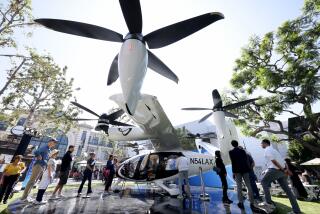What New Export Goes ‘Tuk-Tuk’?
- Share via
BANGKOK, Thailand — Anyone who knows Bangkok knows the “tuk-tuk”--the ubiquitous three-wheel, open-air taxis that roar through traffic-clogged streets, squeezing, dodging and nipping past bigger vehicles with their often white-knuckled passengers.
The tuk-tuk, so-called because of the putting sound of its smoky two-stroke engine, is a hardy vehicle that fans liken to a golf cart on steroids. It epitomizes Thailand and other southern Asian nations, and one businessman thinks it would be good for the rest of the world, too.
Choopong Kiangsiri, chairman of Asian Quality Co., started exporting upgraded tuk-tuks in early March to several countries, including Egypt, New Zealand, the Netherlands and Spain. Most will be used at tourist destinations and resorts.
“Almost 10 countries are interested, but the quantity is not big because they want to try it out first,” Choopong said.
The new “VIP” tuk-tuk, completely Thai-made except for the motorcycle engine, costs 200,000 baht, about $5,000, and looks somewhat classier than the model prowling Bangkok’s streets.
Instead of being open-air--a big problem with the local model, which exposes passengers to the exhaust of buses, trucks and cars--the VIP version is enclosed and air-conditioned. It also has seats for six passengers, rather than three.
In fact, it looks more like a baby minivan than a tuk-tuk, but Choopong insists it’s a tuk-tuk because it runs on three wheels and has the same basic design.
The idea of a different type of tuk-tuk for export struck Choopong during the last Asian Games, the continent’s biggest sports competition, which took place in Bangkok in 1998.
Owner of a factory that makes iron gates and doors, Choopong was selected by the Asian Games organizers to take care of housing the athletes. Some were put up at a university campus where tuk-tuks were used to ferry people around.
“I thought of building a different type of tuk-tuk, using different types of parts, which are plentiful here, since Thailand has an advanced auto industry,” Choopong said.
Thailand is home to factories owned by Toyota, General Motors, Ford, Mitsubishi and several other auto makers.
With an investment of $270,000, Choopong got a team of Thai engineers together at his factory in Samut Prakan province, near Bangkok. Some of the machinery he already had could be modified to make tuk-tuks, and his skilled workers easily made the transition.
But it won’t be so easy for Choopong’s three-wheel wonders to run on the streets of their own country.
A limited number of tuk-tuks are allowed on the streets, and the only new models hitting the road are replacements. Each must be registered with the government as a means of public transport, a laborious process.
Choopong also will have to win over the tuk-tuk cooperatives, which have been set up over the years to rent vehicles to drivers and have a virtual lock on licenses.
His company is holding talks with the Industry, Transport and Finance ministries to get the new tuk-tuk version accepted as a public vehicle. Until that happens, Choopong probably won’t contact the cooperatives.
But he says there has been interest by hotel and resort owners in using tuk-tuks in their compounds, which would not need require licensing. He hopes to sell 300 vehicles this year.
While the VIP tuk-tuk still has to get past those bumps, Choopong has another modified tuk-tuk that is zooming ahead. It’s a $4,000 garbage-truck version that can carry 1,540 pounds of trash.
The garbage tuk-tuk has already been registered as a public vehicle and Choopong’s company has received several orders over the past year, including from the Bangkok Metropolitan Authority. The model also has been exported to Kuwait and several African countries.
It can be converted to a water truck by replacing the garbage bin with a water tank.
More to Read
Sign up for Essential California
The most important California stories and recommendations in your inbox every morning.
You may occasionally receive promotional content from the Los Angeles Times.













